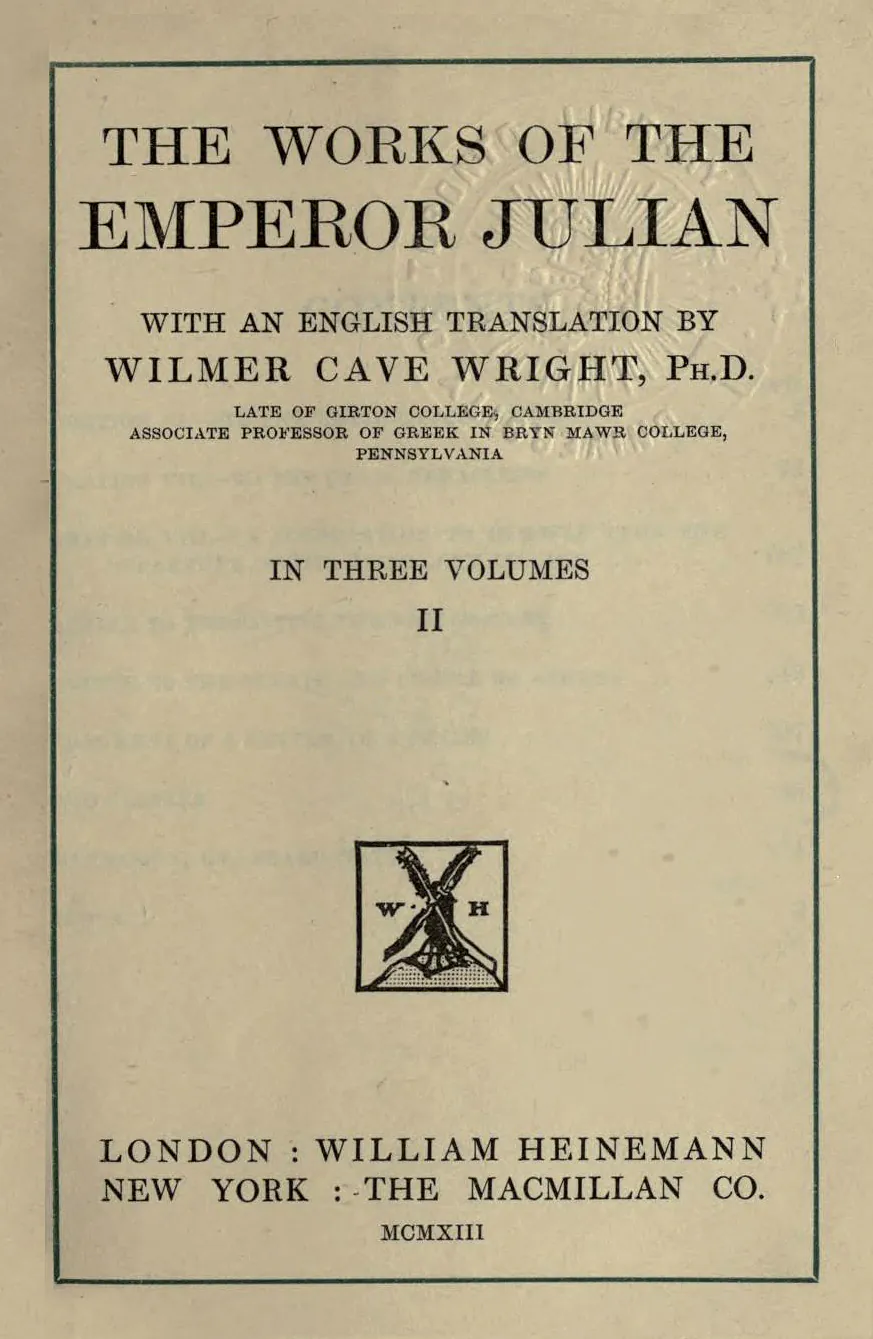[A]
εὖ γὰρ ἴστε ὅτι ταύτης ἡμῖν ἐκοινώνησαν οἱ θεοὶ τῆς ἀτιμίας παρὰ τῇ πόλει.
Τὸ Χῖ, φασίν, οὐδὲν ἠδίκησε τὴν πόλιν οὐδὲ τὸ Κάππα. τί μέν ἐστι τοῦτο τῆς ὑμετέρας σοφίας τὸ αἴνιγμα ξυνεῖναι χαλεπόν, τυχόντες δ ̓ ἡμεῖς ἐξηγητῶν ἀπὸ τῆς ὑμετέρας πόλεως ἐδιδάχθημεν ἀρχὰς ὀνομάτων εἶναι τὰ γράμματα, δηλοῦν δ ̓ ἐθέλειν τὸ μὲν Χριστόν, τὸ δὲ Κωνστάντιον. ἀνέχεσθε οὖν
[B]
μου λέγοντος μετὰ παρρησίας. ἓν μόνον ὑμᾶς ὁ Κωνστάντιος ἠδίκησεν, ὅτι με καίσαρα ποιήσας οὐκ ἀπέκτεινεν· ὡς τά γε ἄλλα ὑμῖν μόνοις ἐκ πάντων Ῥωμαίων πολλῶν δοῖεν οἱ θεοὶ Κωνσταντίων πειραθῆναι, μᾶλλον δὲ τῶν ἐκείνου φίλων τῆς πλεονεξίας. ἐμοὶ γὰρ ὁ ἀνὴρ καὶ ἀνεψιὸς ἐγένετο καὶ φίλος. ἐπεὶ δὲ πρὸ τῆς φιλίας εἵλετο τὴν ἔχθραν, εἶτα ἡμῖν οἱ θεοὶ τὸν πρὸς ἀλλήλους ἀγῶνα λίαν ἐβράβευσαν φιλανθρώπως,
[C]
ἐγενόμην αὐτῷ πιστότερος φίλος ἢ προσεδόκησεν ἕξειν με πρῖν ἐχθρὸν γενέσθαι. τί οὖν οἴεσθέ με τοῖς ἐκείνου λυπεῖν ἐγκωμίοις, ὃς ἄχθομαι τοῖς λοιδορουμένοις αὐτῷ; Χριστὸν δὲ ἀγαπῶντες ἔχετε πολιοῦχον ἀντὶ τοῦ Διὸς καὶ τοῦ Δαφναίου καὶ τῆς Καλλιίπης, ἣ τὸ σόφισμα ὑμῶν ἀπεγύμνωσεν. Ἐμισηνοὶ Χριστὸν ἐπόθουν οἱ πῦρ ἐμβαλόντες τοῖς τάφοις τῶν Γαλιλαίων; ἐλύπησα δ ̓ ἐγὼ τίνας Ἐμισηνῶν πώποτε;
[D]
ὑμῶν μέντοι πολλοὺς καὶ ὀλίγου δέω φάναι πάντας, τὴν βουλήν, τοὺς εὐπόρους, τὸν δῆμον. ὁ μὲν γὰρ δῆμος ἄχθεταί μοι τῷ πλείστῳ μέρει, μᾶλλον δ ̓ ἅπας ἀθεότητα προελόμενος, ὅτι τοῖς πατρίοις ὁρᾷ τῆς ἁγιστείας θεσμοῖς προσκείμενον, οἱ δὲ δυνατοὶ κωλυόμενοι πολλοῦ πάντα πωλεῖν ἀργυρίου, πάντες δὲ ὑπὲρ τῶν ὀρχηστῶν καὶ τῶν θεάτρων, οὐχ ὅτι τοὺς ἄλλους ἀποστερῶ τούτων,
[A]
For be assured that the gods have shared with me in the disrespect that has been shown to me in your city.
“The Chi,” say the citizens, “never harmed the city in any way, nor did the Kappa.” Now the meaning of this riddle which your wisdom has invented is hard to understand, but I obtained interpreters from your city and I was informed that these are the first letters of names, and that the former is intended to represent Christ, the latter Constantius.
[B]
Bear with me, then, if I speak frankly. In one thing Constantius did harm you, in that when he had appointed me as Caesar he did not put me to death. Now for the rest may the gods grant to you alone out of all the many citizens of Rome to have experience of the avarice of many a Constantius, or I should say rather, of the avarice of his friends. For the man was my cousin and dear to me; but after he had chosen enmity with me instead of friendship, and then the gods with the utmost benevolence arbitrated our contention with one another,
[C]
I proved myself a more loyal friend to him than he had expected to find me before I became his enemy. Then why do you think that you are annoying me by your praises of him, when I am really angry with those who slander him? But as for Christ you love him, you say, and adopt him as the guardian of your city instead of Zeus and the god of Daphne and Calliope1There was a statue of Calliope in the market-place at Antioch. who revealed your clever intention? Did those citizens of Emesa long for Christ who set fire to the tombs of the Galilaeans?2The people of Emesa burned the Christian churches and spared only one, which they converted into a temple of Dionysus. But what citizens of Emesa have I ever annoyed?
[D]
I have however annoyed many of you, I may almost say all, the Senate, the wealthy citizens, the common people. The latter indeed, since they have chosen atheism, hate me for the most part, or rather all of them hate me because they see that I adhere to the ordinances of the sacred rites which our forefathers observed; the powerful citizens hate me because they are prevented from selling everything at a high price; but all of you hate me on account of the dancers and the theatres. Not because I deprive others of these pleasures,
EN translation: Wilmer Cave Wright, 1913
LEARN MORE
Place your mouse over a term to see corresponding popup from Wikipedia.
ALL PAGES

| Title | London: The Works of the Emperor Julian, Volume II/III |
| Publisher | London: William Heinemann |
| Year | 1913-23 |
| Pages | 416-511 pp. [vol. II: 538 pp.] |
| Translation | Wilmer Cave Wright. PhD |
| Editors | T.E. Page and W.H.D. Rouse |


